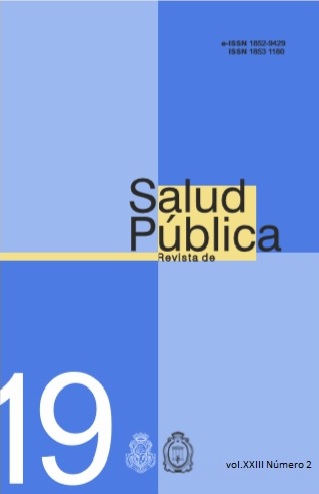ASSESSMENT OF THE EFFECT OF A WHATSAPP BASED INTERVENTION FOR PATIENTS WITH HIGH BLOOD PRESSURE.
DOI:
https://doi.org/10.31052/1853.1180.v23.n2.20610Keywords:
high blood pressure, telemedicine, lifestyle, compliance, adherence to treatment.Abstract
Objective: To assess the effect of an intervention using Whatsapp aimed at people with high blood pressure in Xalapa, Veracruz, Mexico. Material and Methods: A randomized controlled clinical trial was designed; 40 patients with high blood pressure were recruited in each group. Considering Behavior Change Techniques, 65 elements were developed and distributed via WhatsApp. Different variables were considered: anthropometric, physiological, clinical, therapeutic adherence and knowledge about hypertension, among them. An intention-to-treat analysis was carried out for the treatment of losses. Results: In the experimental group, the observed change was related to modifications in eating habits and exercise, contrasting with those subjects who only received the usual treatment. Discussion: Receiving information via WhatsApp motivates and makes patients take care of themselves. It is recommended to reproduce this type of intervention in different populations or with other diseases.Downloads
References
Organización Mundial de la Salud. Información general sobre la Hipertensión en el mundo. Una enfermedad que mata en silencio, una crisis de salud pública mundial [Internet]. Ginebra, Suiza; 2013. Available from: https://cutt.ly/0e3MNPY
Martín Alfonso L. Acerca del concepto de adherencia terapéutica. Rev Cuba Salud Pública. 2004;30(4):1–6.
Instituto Nacional de Salud Pública, Secretaria de Salud. Encuesta Nacional de Salud y Nutrición de Medio Camino 2016. (ENSANUT 2016). Informe final de resultados [Internet]. Vol. 2016. 2016. Available from: http://promocion.salud.gob.mx/dgps/descargas1/doctos_2016/ensanut_mc_2016-310oct.pdf
Secretaria de Salud. Informe sobre la Salud de los Mexicanos 2015. Diagnóstico General de la Salud Poblacional [Internet]. 2015. Available from: https://cutt.ly/Te3M8lg
Instituto Nacional de Salud Pública. Encuesta Nacional de Salud y Nutrición. Resultados por entidad federativa. Veracruz. 2013.
Zurera Delgado I, Caballero Villarraso M, Ruíz García M. Análisis de los factores que determinan la adherencia terapéutica del paciente hipertenso. Enferm Nefrol. 2014;17(4):251–60.
Sánchez-Cisneros N. Adherencia terapéutica en hipertensión arterial Sistémica. Rev Mex Enfermería Cardiológica. 2006;14(3):98–101.
WHO. New horizons for health through mobile technologies [Internet]. Vol. 3. Geneva, Switzerland; 2011. Available from: http://www.who.int/goe/publications/goe_mhealth_web.pdf
Riley W, Rivera D, Atienza A, Nilsen W, Allison S, Mermelstein R. Health behavior models in the age of mobile interventions: are our theories up to the task? Transl Behav Med [Internet]. 2011 Mar [cited 2013 Oct 18];1(1):53–71. Available from: http://www.pubmedcentral.nih.gov/articlerender.fcgi?artid=3142960&tool=pmcentrez&rendertype=abstract
Tomlinson M, Rotheram-Borus MJ, Swartz L, Tsai AC. Scaling up mHealth: where is the evidence? PLoS Med [Internet]. 2013 Jan [cited 2013 Aug 7];10(2):e1001382. Available from: http://www.pubmedcentral.nih.gov/articlerender.fcgi?artid=3570540&tool=pmcentrez&rendertype=abstract
INEGI. Tabulados de la Encuesta Nacional sobre disponibilidad y uso de Tecnologías de la Información en los hogares, 2017. 2017.
Sanz Gil JJ. WhatsApp: Potencialidad educativa versus dependencia y adicción. Rev Didáctica, Innovación y Multimed [Internet]. 2014;30:20. Available from: http://dim.pangea.org/revistaDIM30/docs/OC30whatsapp.pdf
Asociación de Internet.mx. 13° Estudio sobre los Hábitos de los Usuarios de Internet en México 2017. 2017.
Rambe P, Bere A. Using mobile instant messaging to leverage learner participation and transform pedagogy at a South African University of Technology. Br J Educ Technol. 2013;44(4):544–61.
Bobrow K, Farmer AJ, Springer D, Yu L, Brennan T, Rayner B, et al. Mobile Phone Text Messages to Support Treatment Adherence in Adults With High Blood Pressure ( StAR ): A Single-Blind , Randomized Trial. Circulation. 2016;133(6):592–600.
Márquez Contreras E, de la Figuera von Wichmann M, Gil Guillén V, Ylla-Catalá A, Figueras M, Balaña M, et al. Effectiveness of an Intervention To Provide Information To Patients With Hypertension As Short Text Messages and Reminders Sent To Their Mobile Phones (Hta-Alert). Atención Primaria [Internet]. 2004;34(8):399–405. Available from: http://dx.doi.org/10.1016/S0212-6567(04)78922-2
Mars M, Escott R. WhatsApp in clinical practice: A literature review. Stud Health Technol Inform. 2016;231:82–90.
Pandey A, Singh SP, Pandey J, Gupta V, Verma R. Use of WhatsApp in Pediatric Surgery Division of General Surgery Department: Is it Worthwhile? J Indian Assoc Pediatr Surg. 2017;22(1):62–3.
Alghafri TS, Alharthi SM, Al-farsi YM, Craigie AM, Mcleod M, Anderson AS. Study protocol for “MOVEdiabetes”: a trial to promote physical activity for adults with type 2 diabetes in primary health care in Oman. BMC Public Health. 2017;17:1–7.
Abraham C, Michie S. A taxonomy of behavior change techniques used in interventions. Heal Psychol [Internet]. 2008;27(3):379–87. Available from: http://doi.apa.org/getdoi.cfm?doi=10.1037/0278-6133.27.3.379
Estrada-Reventos D, Ho-Wong TM, Agudo-Ugena JP, Arias-Barroso P, Capillas-Pérez R, Gibert-Llorach E, et al. Validación de un cuestionario de conocimientos sobre la hipertensión. Hipertens Riesgo Vasc. 2013;30(4):127–34.
Herrera Guerra E. Adherencia al tratamiento en personas con hipertensión arterial. Av Enferm. 2012;XXX(2):67–75.
Hallberg I, Ranerup A, Bengtsson U, Kjellgren K. Experiences, expectations and challenges of an interactive mobile phone-based system to support self-management of hypertension: patients’ and professionals’ perspectives. Patient Prefer Adherence [Internet]. 2018;Volume 12:467–76. Available from: https://www.dovepress.com/experiences-expectations-and-challenges-of-an-interactive-mobile-phone-peer-reviewed-article-PPA
Díaz RML, Ramírez PH. El placebo y el efecto placebo. Rev Cuba Hematol Inmunol y Hemoter. 2012;5(1):37–46.
Acosta M, Debs G, Noval R, Dueñas A. Conocimientos, creencias y prácticas en pacientes hipertensos, relacionados con su adherencia terapéutica. Rev Cubana Enferm. 2005;21(3):15–23.
Hallberg I, Ranerup A, Kjellgren K. Supporting the self-management of hypertension?: Patients ’ experiences of using a mobile phone-based system. J Hum Hypertens. 2015;30(2):141–6.
Downloads
Additional Files
Published
How to Cite
Issue
Section
License
Copyright (c) 2019 Escuela de Salud Pública y Ambiente. Facultad de Ciencias Médicas. Universidad Nacional de Córdoba

This work is licensed under a Creative Commons Attribution-NonCommercial 4.0 International License.
Authors who publish with this journal agree to the following terms:
- Authors retain copyright and grant the journal right of first publication with the work simultaneously licensed under a Creative Commons Attribution License which allows the work to be copied, distributed, exhibited and interpreted as long as it is not done for commercial purposes.
- Authors are able to enter into separate, additional contractual arrangements for the non-exclusive distribution of the journal's published version of the work (e.g., post it to an institutional repository or publish it in a book), with an acknowledgement of its initial publication in this journal.
- Authors are permitted and encouraged to post their work online (e.g., in institutional repositories or on their website) after the publication process. (See The Effect of Open Access). (See The Effect of Open Access).



